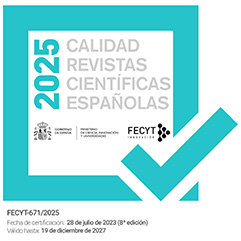What Is at Stake in the Recognition of Non-Normative Identities?
DOI:
https://doi.org/10.17561/tahrj.v18.7021Keywords:
Sex-gender system, self-determination, trans, intersex, non-binaryAbstract
The deconstruction of the binary sex-gender system that sustains modern western states demands the deconstruction of its dichotomies and their excluding effects on non-normative identities. This demands in turn that gender self-determination be recognised as a right. In Spain this right has been given constitutional status (STC 99/2019), yet it is currently not articulated in legislation. Proposals of a new legal framework have met with resistance and an ensuing need for compromise. Unless it grasps and upholds the full constitutional extent of the right to gender self-determination, however, legislation risks being born both unconstitutional and obsolete, out of pace with social demands.
Downloads
References
AGHA, Petr (2019), “Subjectivity, gender and agency”, in P. Agha (ed.), Law, Politica and Gender, Routledge, Oxford, pp. 61-80. https://doi.org/10.4324/9781351047005-6
AMMATURO, Francesca R. (2019), “Can human rights exist without gender? LGBTQI issues and the Council of Europe”, in Peter Agha (ed.), Law, Politica and Gender, Routledge, Oxford, pp. 33-44. https://doi.org/10.4324/9781351047005-4
BUTLER, Judith (1990), Gender Troubles. Feminism and the Subversion of Identity, Routledge, London & New York.
BUTLER, Judith (1993), Bodies that Matter. On the discursive limits of sex, Routledge, London & New York.
COSSUTTA, Carlotta (2019), “Linguistic traps: identity and differences through institutions”, in Peter Agha (ed.), Law, Politica and Gender, Routledge, Oxford, pp. 45-60.
https://doi.org/10.4324/9781351047005-5
DEVOR, Holly (1989), Gender Blending. Confronting the limits of duality, Indiana University Press, Bloomington and Indianapolis.
DOSE, Ralf (2014), Magnus Hirschfeld: The Origins of the Gay Liberation Movement, Monthly Review Press, New York.
DREGER, Alice D. (1998), Hermaphrodites and the Medical Invention of Sex, Harvard University Press, Cambridge, MA.
FAUSTO-STERLING, Anne (2000 [2020ed.]), Sexing the Body. Gender Politics and the Construction of Sexuality, Basic Books, New York
FOUCAULT, Michel (1976 [1981ed]), The Will to Knowledge. The History of Sexuality 1, Penguin Books, Middlesex.
FOUCAULT, Michel (1980), Herculine Barbin (Introduction), New York: Vintage Books.
GHATTAS, Dan C. (2020), Protecting Intersex People in Europe: A Toolkit for Law and Policymakers, ILGA Europe, Brussels.
HIRSCHFELD, Magnus (1918 [2015ed.]), Sexuelle Zwischenstufen, Fachbuchverlag Dresden, Dresden,
KESSLER, Suzanne (1998), Lessons from the Intersexed, Rutgers, New Jersey.
KESSLER, Suzanne & MCKENNA, Wendy (1978), Gender. An Ethnomethodological Approach, Chicago University Press, Chicago.
KING, Helen (2016), The One-Sex Body on Trial: The Classical and Early Modern Evidence, Routledge, London. https://doi.org/10.4324/9781315555027
LACQUEUR, Thomas (1990), Making Sex. Body and Gender from the Greeks to Freud, Cambridge University Press, Cambridge, MA.
LEWONTIN, Richard C. (1993), Biology as Ideology. The Doctrine of the DNA, Harper Perennial, New York.
PATEMAN, Carole (1988), The sexual contract, Stanford University Press, Stanford.
PATEMAN, Carole (1989), The Disorder of Women, Stanford University Press, Stanford.
PLATERO, Lucas (2016), “La transfobia también es una lucha feminista”, Viento Sur, nº 146, pp. 55-61.
PRECIADO, Paul B. (2020), Yo soy el monstruo que os habla. Informe para una academica de psicoanalistas, Anagrama, Barcelona.
RODRÍGUEZ RUIZ, Blanca (2019), El discurso del cuidado. Propuestas (de)constructivas para un estado paritario, Tirant lo Blanch, Valencia.
RUBIO MARÍN, Ruth & OSELLA, Stefano (2020), “El Nuevo derecho constitucional a la identidad de género: entre la libertad de elección, el incremento de categorías y la subjetividad y fluidez de sus contenidos. Un análisis desde el derecho comparado”, Revista Española de Derecho Constitucional, nº 118, pp. 45-75.
https://doi.org/10.18042/cepc/redc.118.02
SALAZAR BENÍTEZ, Octavio (2015), “La identidad de género como derecho emergente”, Revista de Estudios Políticos, nº 169, pp. 75-107.
https://doi.org/10.18042/cepc/rep.169.03
SALVATORE, Ingrid (2019), “The politicisation of sexuality: feminism, difference, differences”, in Peter Agha (ed.), Law, Politica and Gender, Routledge, Oxford, pp. 8-20. https://doi.org/10.4324/9781351047005-2
THEILEN, Jens T. (2020), “Subversion subverted: Developments in German Civil Status Law on the Recognition of Intersex and Non-Binary Persons”, Eva Brems, Pieter Cannoot and Toon Moonen (eds.), Protecting trans* rights in the age of gender self-determination, Intersentia, Cambridge, UK, pp. 95-120.
https://doi.org/10.1017/9781839700897.005
YOUNG, Iris M. (1996), “Communication and the Other. Beyond Deliberative Democracy”, in Seyla Benhabib (ed.), Democracy and Difference. Contesting the Boundaries of the Political, Princeton University Press, Princeton, pp. 120-135.
https://doi.org/10.1515/9780691234168-007
WITTIG, Monique (1992), “On the Social Contract”, in The Straight Mind and other Essays, Beacon Press, Boston, pp. 33-45.
Published
Issue
Section
License
Copyright (c) 2022 Blanca Rodríguez Ruiz

This work is licensed under a Creative Commons Attribution 4.0 International License.




























